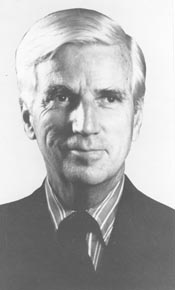Jonathan B. Bingham
| Jonathan Brewster Bingham | |
|---|---|
 |
|
| Member of the U.S. House of Representatives from New York's 22nd district |
|
|
In office January 3, 1973 – January 3, 1983 |
|
| Preceded by | Herman Badillo |
| Succeeded by | Benjamin A. Gilman |
| Member of the U.S. House of Representatives from New York's 23rd district |
|
|
In office January 3, 1965 – January 3, 1973 |
|
| Preceded by | Charles A. Buckley |
| Succeeded by | Peter A. Peyser |
| Personal details | |
| Born |
April 24, 1914 New Haven, Connecticut |
| Died | July 3, 1986 (aged 72) New York City |
| Political party | Democratic Party |
| Spouse(s) | June Rossbach Bingham |
| Alma mater |
Yale University Yale Law School |
| Awards | War Department citation |
| Military service | |
| Service/branch | United States Army |
Jonathan Brewster Bingham (April 24, 1914 – July 3, 1986) was an American politician and diplomat. He was the US delegate to the United Nations General Assemblies and was elected to Congress.
Bingham was born in New Haven, Connecticut. His father, Hiram Bingham III, was a Senator and explorer and his great grandfather, Hiram Bingham I, was a missionary, who helped translate the Bible into Hawaiian.
Bingham attended Hamden Hall Country Day School and Groton School and graduated from Yale University in 1936 with a BA and from Yale Law School in 1939 with a law degree. He was a member of Skull and Bones, class of 1936. In 1940 he was admitted to the bar, and began the practice of law in New York City. His practice was interrupted in August 1941, when he joined the Machinery Branch of the newly created Office of Price Administration (OPA) as a legal advisor. He was not at the OPA for long, for in 1942 he joined the Military Intelligence Service. In April of the following year he was enlisted as a private in the United States Army and was discharged a captain in October 1945 with a War Department citation.
On his return he was appointed chief of the newly created Alien Enemy Control Section of the State Department. The Alien Enemy Control Section was unpopular and short-lived. Bingham got off the boat before it sank, resuming the practice of law in New York City in 1946.
He left the practice of law again in 1951 to become assistant director of the Office of International Security Affairs. Bingham left in the same year to become deputy administrator of the Technical Cooperation Administration, implementing the Point 4 Program of technical assistance to developing countries. His book, Shirt-Sleeve Diplomacy: Point 4 in Action, was published in 1953. He left the administration in that year and resumed the practice of law. In 1955 he became secretary to fellow Bonesman, W. Averell Harriman, while he was Governor of New York. When Harriman was defeated in the 1958 election by Nelson Aldrich Rockefeller, Bingham joined the law firm Goldwater & Flynn.
...
Wikipedia
